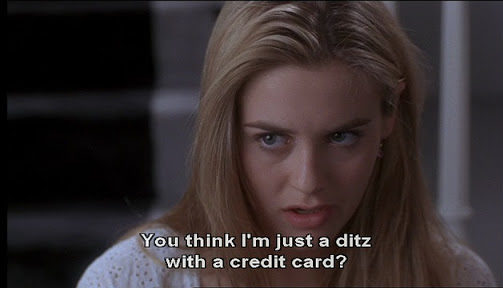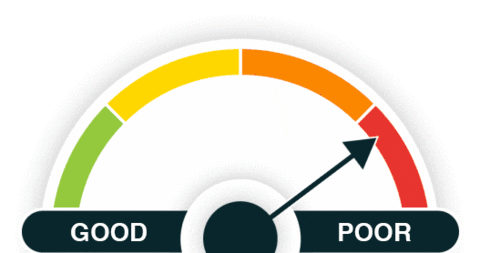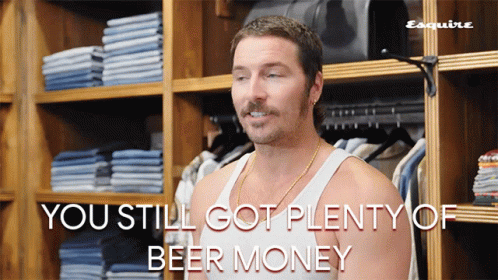
It’s finally happened. I’ve reached that level of boredom where I’ve decided to be a better adult.
Don’t get me wrong, I’ve still got three kilos of washing crammed into the corner of my room, I have no intention of shaving any time soon and the vacuum is sitting in the laundry dormant, slowly gathering more dust than it could feasibly suck up.
But, the fact that I voluntarily spoke to my housemate about banking shows that I’m willing to grow – albeit at snail’s pace.
I’m not exactly well-versed in anything banking or finance-related, aside from your standard direct debits and bank transfers. I can also tap my card on those EFTPOS machines like a bloody pro, so I guess you could say I’m crushing it.
But I wanted to dive deeper. I’m sick of my clueless eyes glazing over when people drop terms like ‘credit score’, so I asked my significantly more switched on pal to explain a few key concepts to me. At the very least, if I ever go on a date with a banking man person (a banker?), I can hold the conversation.
Here’s what I learnt from the arduous chat.
You kind of need a credit score to do things

Having never owned a credit card in my life, I never really understood the ins and outs of a credit score.
As my housesmate is somewhat of a credit card aficionado, she informed me that using one can actually be beneficial – if you have the means to pay it off on time – as it means you’ll be ‘on the grid’, and you’re much more likely to be approved for a home loan or personal loan if creditors have some knowledge of how smart you are with your money (aka a good credit score).
It’s a bit of a catch 22 though. If you’ve made multiple late payments, or you’ve missed mortgage payments etc, you’ll likely have a crappier credit score which might make it harder for you in the long run.
So from what it sounds like, you need to start thinking about your credit score now – while credit cards certainly affect it, so too do setups like Afterpay.
Just make sure you’re financially stable so you aren’t sending it into a downward spin without even realising.
Here’s how to check your own score.
Personal loans can be handy (if you’re smart about it)
Personal loans sound scary as hell, probably because the idea of coming into a large sum of money that isn’t technically all yours is a responsibility many of us try to swerve.
But I’m an adult with a steady income now, so a personal loan is sounding less and less daunting. Whether your car’s in desperate need of a replacement (or, it got towed and you can’t be bothered paying to get it un-impounded), you want to consolidate your debt or you need to fork out some cash for further education, a personal loan could be the route for you.
As a bonus, it’ll also help you get one of those credit score things I was just talking about.
I implore everyone who’s interested in a personal loan to calculate how much you can feasibly apply for without sending yourselves down Schitt’s creek without a paddle.
I have my own calculator in the form of my housemate. Her advice? Don’t take out a personal loan for that jumping castle I saw on Gumtree.
Good advice.
Missing any sort of recurring payment can be a big no-no
I’m the first to admit that I’m no angel when it comes to my Afterpay accounts. Yes, I get the text saying it’s going to come out of my account on X date, yes I make a note to ensure I have that money in my account, no I don’t follow up and move said money into my account, yes I get the text saying my Afterpay payment failed.
As it goes though, missing a payment too often can actually negatively affect your credit score (remember the credit scores I talked about?). My housemate is a bit smarter in this area, so you best believe I copped the judgemental look when I told her how often I’d missed my Afterpay payments (and no, I shan’t be repeating it here just to attract scorn from strangers).
This goes far beyond Afterpay, though. If you miss a credit card, mortgage or personal loan payment, that’s gonna look hella bad on your end, and it may prove to cause some problems in the long run when you apply for another line of credit.
Savings accounts you can’t see are your new life partner
This has been a lifesaver for me and, once again, I got the idea from my savvy co-inhabitant.
From experience, I’m far more likely to spend money on things if I can actively see the amount of money I have in my savings. So, my advice to you that I pass on after receiving the same advice, is to find a savings account that’s separate to your everyday spending account.
If you hunt around, you can even find savings accounts that let you earn a percentage of your deposits every year. I’m currently with an account that only gives me money if I don’t transfer any money out, but accounts like this one will let you earn 1.70% on your savings per annum – if you deposit $1000 a month from a non-CUA account – regardless of if you move money around or not.
So, to ensure the 1.70%, just transfer over a chunk of your wage as soon as it drops into your account.
Don’t be overambitious with your budgeting
This felt like a direct attack because I didn’t really ask my housemate this question, she just went in on how I always put too much money away at the start, realise I’m going over my budget halfway through the month and, instead of tightening my purse strings, I say ‘screw it’ and blow out my budget completely.
This isn’t a sustainable habit, I’m aware of this, so I reckon it’s best to start small. There’s no point transferring 80% of your wage to a savings account if you’re just going to transfer most of it back out within two weeks.
Aim for a budget that’s actually achievable and you’ll be less inclined to drain your savings out of desperation and spite.







